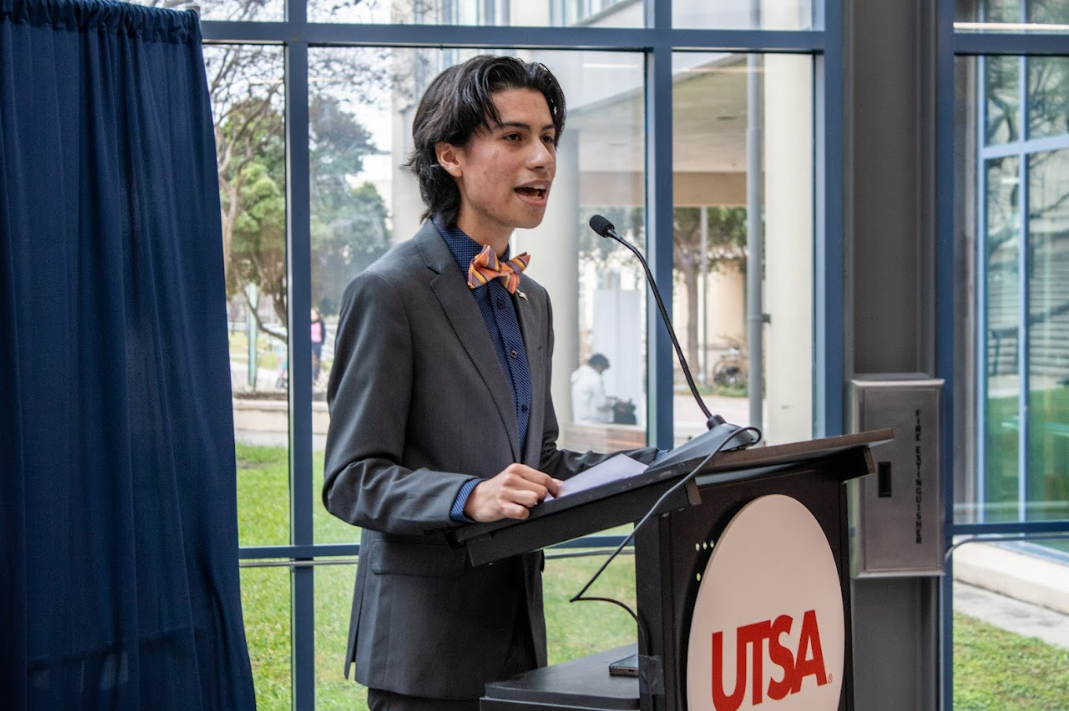In their 48th General Assembly, the Student Government Association (SGA) launched its sixth session of the semester, addressing a variety of topics such as free textbooks and improved safety on the Main and Downtown Campuses.
The meeting began with an open forum where students were given the opportunity to express any concerns which were met with possible solutions and resources from SGA officers.
The first student to bring an issue to light was an auditing student having trouble obtaining his UTSA ID card. An auditing student is a student who takes courses for their own educational benefit rather than to receive academic credit. The student expressed that he has been unable to receive a UTSA ID card because he is not an official UTSA student. He added that this concerns him because it leaves him as an unidentified individual while auditing classes on-campus.
President Zachary Nepote commended the student for speaking up and presented him to their Academic Affairs representative Sharon Madiba Martinez.
Two liaisons, Manuel Bocanegra and Moses Hernandez, from UTSA Housing then took over the open forum to express their excitement about their plan to collaborate with SGA in the future. They expressed that they hope UTSA Housing can grow to assist students in becoming more involved on and off campus. The speakers mentioned that their residents’ success initiative team has recently expanded from five to fifteen persons and that they wish to collaborate with five or six SGA members to continue developing.
Following the open forum, guest speakers were free to outline any future plans or activities.
The first guest speaker was UTSA Police Officer Eric Rubio. He explained that since UTSA is a public university, the police department’s top priority is to keep students safe. Rubio added that UTSA’ s Police Department offers several resources for students to ensure their safety. He mentioned their escort services, Rowdy Watch and the LiveSafe App.
Rubio expanded on RowdyWatch and its importance, as it allows students to apply for part-time patrolling roles. Their duties include operating a UTSA-certified golf cart and patrolling locations on campus. If the student detects any suspicious behavior while patrolling, UTSA police will be contacted. Students are compelled to give an ID to an officer under the Texas Education Code. “We can actually ID anybody without reasonable suspicion or probable cause, we have to protect everybody here on campus,” the officer said.
The officer added that the Police Department works directly with UTSA counseling services as well, emphasizing that student’s mental well-being is being prioritized as well. Counseling services and self-defense lessons are also provided for free.
It was also brought up that as the Downtown Campus expands, it will see an increase in its total number of officers, as there are currently only two police officers and a public safety officer working downtown. Officer Rubio also mentioned that future downtown student housing designs are in the works and are expected to include 24-hour police protection as well as the previously mentioned amenities.
The remaining guest presenters were Open Education Coordinator DeeAnn Ivie and Library Services Assistant Chayla De La Garza. Ivie gave a presentation on open educational resources (OER) and how students can benefit from being educated on OER and its many resources.
Ivie explained that OER is a complex resource that can create a deeper engagement for students at a university by permitting them access to a wide range of teaching and learning materials that students can use and reuse at no cost due to the Creative Commons license. For example, access to OER can provide students with low-cost or free textbooks.
Publishing work under Creative Commons licensing means that it is totally free for use by anybody without compensation to the creator, and it has fewer limitations than standard copyright materials. Authors retain ownership of the copyright and can do anything they want with the information or even merge it with other items.
Ivie stated that with the grant program, the library has saved 13 million dollars thanks to OER and has granted over 150 grants to professors. What distinguishes OER from a library is the ability for students to continue to access all knowledge, even after graduation.
SGA will be hosting working sessions to offer students the opportunity to ask questions, discuss ideas and get involved. A session was held on Monday, and another will be held from 4 to 6 p.m. on Wednesday in the SGA office (HEB SU 1.214) to further promote educational equity.
After the guest speakers concluded, the members of SGA analyzed previous events as well as impending news. SGA will have its second leader fund workshop on Nov. 26. This is a reimbursement fund that will allow student groups to obtain funds. The application form is accessible to all well-established student groups, and the application deadline is Dec. 7.
For more information on OERs at UTSA, visit lib.utsa.edu/oer/.
SGA will be holding a town hall meeting at 5:30 p.m. next Thursday at the Downtown Campus. Guests are encouraged to attend and voice their concerns “regarding safety, beautification, academic resources and general enhancements.” The meeting will take place in the assembly room in Building 1.338 on Buena Vista Street.
The next SGA general assembly will be held at 5:30 p.m. on Nov. 16 at the Harris-Travis Room (2.202 and 2.212) in the H-E-B Student Union, and all UTSA students are welcome to attend.




